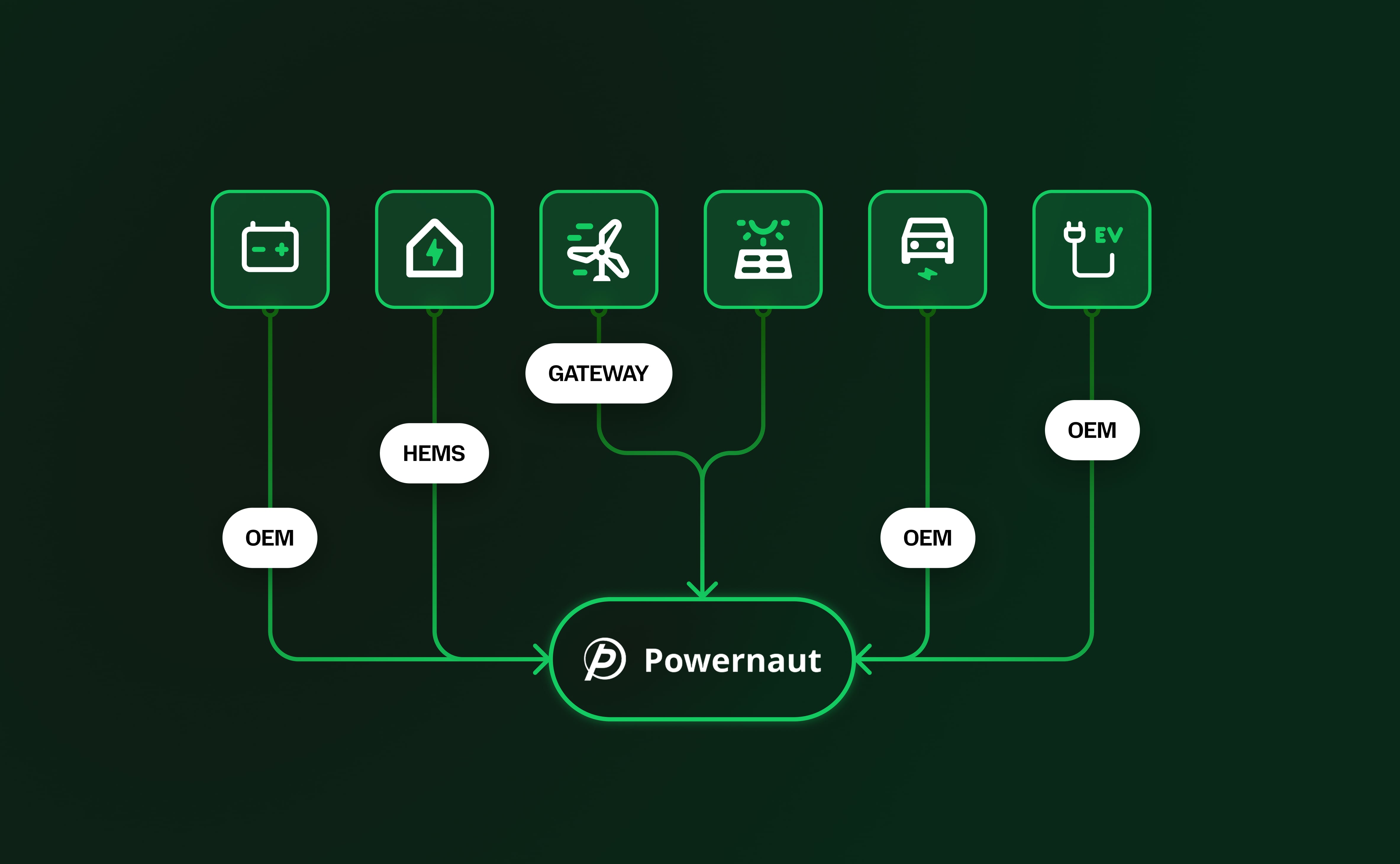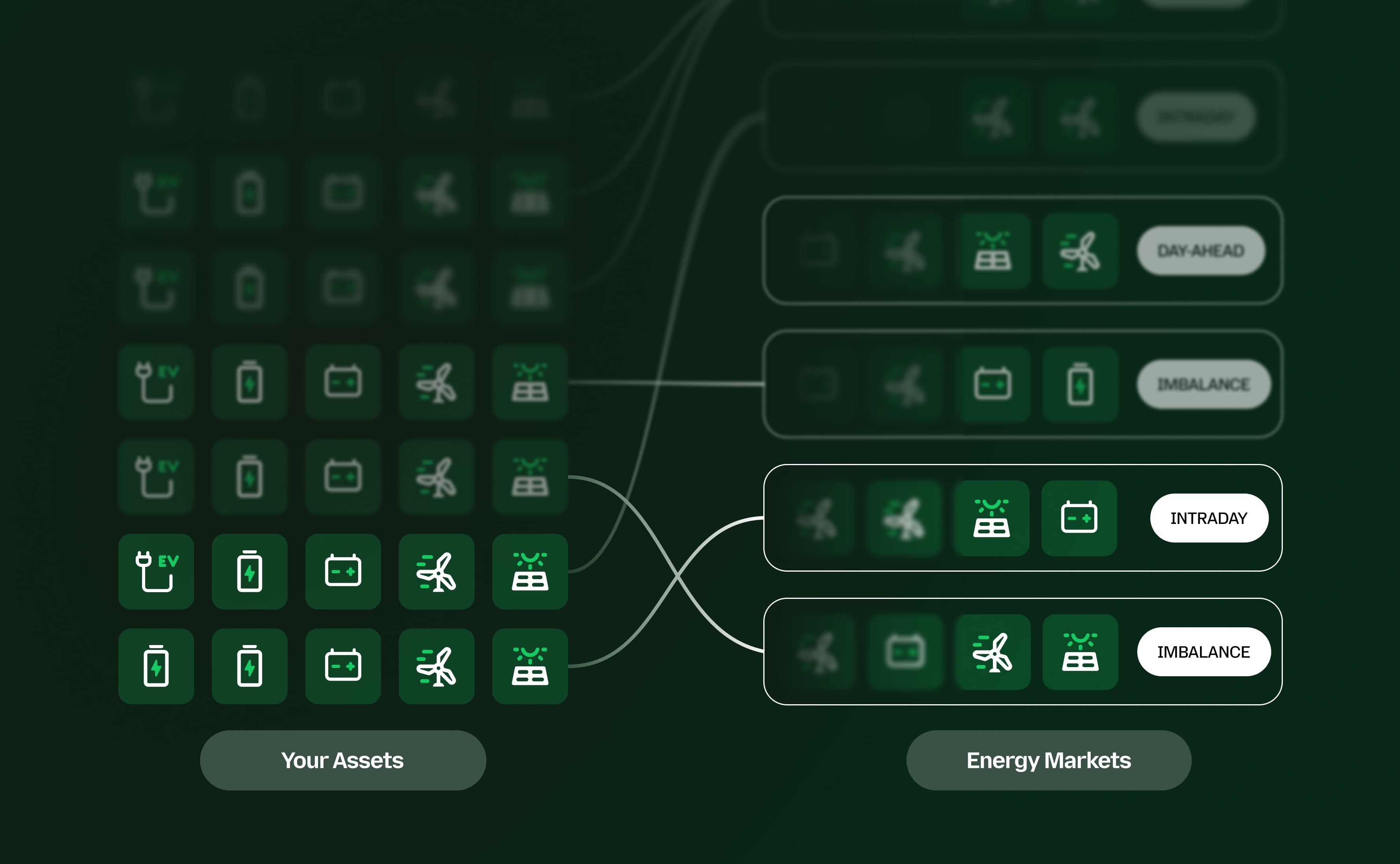On a mission to change the Belgian energy market



Luminus & Powernaut
Facts and Figures
Type: Energy retailer
Location: Belgium
Scope: Residential sites
Assets Managed: Solar installations, home batteries, EV chargers, heat pumps
Business Target: Significant capacity onboarding by Summer 2025
Key Result: Proven business cases across all asset types, for example solar installations (PV) generated significant value through imbalance steering.
With our Open VPP, Luminus was able to scale its flexibility services fast. Edouard De Bruyne, Head of Flex at Luminus, explains how.
Context
Belgium is at the forefront of the energy transition, with energy retailers facing the shared challenge of integrating rapidly growing distributed renewables while maintaining grid balance
Problem
As SmartKit, Luminus’s in-house energy management system, scaled to tens and eventually hundreds of business installations, the trading desk needed an efficient way to manage these growing assets. At the same time, Luminus wanted to ensure openness to all customers and all EMS providers
Solution
Powernaut’s Open Virtual Power Plant (VPP) platform gave Luminus a solution that could aggregate their SmartKit systems, work with third-party EMS providers, and connect directly to equipment manufacturers through APIs
Approach
The collaboration took an agile, hands on approach that tested value with residential customers first, then proceeded to build out the B2B platform through close collaboration with home energy systems and connecting everything to Luminus's trading operations
Impact
Luminus now has a scalable, future-ready system managing distributed energy assets that can grow with the market. The business case has been proven across different asset types like solar and home batteries, and strengthened Luminus's position as a flexibility leader
Upscaling flexibility
The energy world has flipped from a one-way street (supplier to consumer) into a two-way system. Electricity now flows both ways, and flexibility is the new currency.
“We don’t just sell electricity anymore. We buy it back, and increasingly, we also need to buy flexibility from our customers.”
Edouard De Bruyne, Head of Flex at Luminus
Before teaming up with Powernaut, Luminus was already ahead in the flexibility game with their own in-house Energy Management System: SmartKit. But as they scaled up from dozens to hundreds of business installations, new challenges appeared.
1. Aggregation at scale
First off: Luminus’ trading department was used to managing large, centralised assets like gas turbines. Suddenly, they faced a swarm of smaller assets, all behaving differently.
“Our trading team was used to steering big assets like gas turbines, not hundreds of small devices. They can’t operate ‘a hundred little buttons’ for every solar panel.”
Edouard De Bruyne, Head of Flex at Luminus
The first challenge for Powernaut was to connect and aggregate those devices so they could act as one virtual asset.
More on connection & aggregation
2. Available for all customers
For a market leader like Luminus, flexibility couldn’t just be a niche service. It had to work for every customer, no matter what Energy Management System (EMS) they use.
“As Belgium’s second-largest energy supplier, we need to offer flexibility to everyone. If tomorrow we have a client with a different system, we want to be able to integrate it into the same platform”
Edouard De Bruyne, Head of Flex at Luminus
3. Trading & balancing
Managing solar panels and batteries at scale isn’t just a technical exercise, it changes the business model. That’s why the solution also had to connect to Luminus’s trading desk, so traders could stay sharp on the flexibility market while keeping the grid balanced.
Powernaut’s Virtual Power Plant
With Powernaut’s Virtual Power Plant (VPP), we delivered exactly what Luminus needed: a platform that turns scattered flexibility into a manageable entity at scale. More than a tool, it was a strategic fit for Luminus.
1. Aggregation made simple
The Open VPP acts as a middleware layer, transforming hundreds of small devices into one manageable entity. So now, instead of traders wrestling with “a hundred little buttons,” the VPP does the heavy lifting: connecting, aggregating, disaggregating and pooling all assets. From EV’s to solar installations and batteries.

2. Open to everyone
Openness was non-negotiable for Luminus. Unlike closed systems, Powernaut’s platform integrates with anything:
- Luminus’s own SmartKit
- Third-party Energy Management Systems
- Direct equipment manufacturer APIs
- Cloud-to-cloud control of household systems
“If tomorrow a client comes with a different system, we are now able to integrate it into the same VPP. That openness makes Powernaut’s platform stand out.”
Edouard De Bruyne, Head of Flex at Luminus
3. Smart forecasting & optimisation
The VPP doesn’t just connect devices, it makes them smarter. A powerful forecasting and optimisation engine:
- Predicts flexibility every minute
- Figures out the most efficient way to dispatch it
- Verifies delivery at site and asset level, crucial for billing and reporting back to grid operators.
More on Forecasting & Optimisation

From pilot to full scale
In short, Powernaut gave Luminus exactly what it needed: a single, reliable workspace to manage flexibility for every customer and asset at scale. Here’s how we got there:
Step 1: Prove the concept
We pooled flexibility from more than ten different EMS across 25 Luminus households. The result: clear proof the approach works in the real world.
Step 2: Map the business needs
Together, Powernaut and Luminus ran workshops, documented requirements in detail, and set up a solid project management framework.
“Things went smoothly thanks to thorough preparation: workshops, clear documentation of requirements, and a proper project management framework.”
Edouard De Bruyne, Head of Flex at Luminus
Step 3: Go live in six weeks
With connectors already in place, our Open VPP linked seamlessly to Luminus’s SmartKit and existing home systems. The platform was live with customers in just six weeks.
Step 4: Build flexible asset pools
Different assets come with different contract terms and optimisation rules. We created dedicated asset pools, making it easier for Luminus to manage residential and business installations side by side.
Step 5: Integrate billing & verification
Flexibility verification and settlement were built right into Luminus’s existing billing system. Even meter correction was added, ensuring customers aren’t penalised for supporting the grid.
Step 6: Keep innovating
On top of the core platform, Powernaut is expanding with cloud-based solar curtailment, white-label onboarding flows, and new APIs tested with inverter manufacturers. Future-proof by design.
Turning flexibility into value
With our Open VPP, Luminus now runs a scalable, future-ready system to manage distributed energy assets. One that grows with the market and strengthens their position as a flexibility leader. While the solution runs in the background and isn’t directly client-facing,Edouard highlights that its biggest win is for Luminus’s trading department:
Proven business cases
The results of the pilot project with 25 households weren’t just promising, they were scalable. This proved the same approach works for both residential customers and business clients.
End-to-end validation
We proved the full chain works: forecasting flexibility, dispatching assets, and verifying delivery down to each site. We set up asset pools with ambitious capacity targets and showed the models hold in real market conditions.
Real market integration
Luminus’s trading teams are already using solar flexibility in daily operations through our platform. And when Belgian grid operator Elia required overrides for solar curtailment, the system adapted instantly.
Future-ready infrastructure
With our Open VPP, Luminus now has the technical foundation to keep scaling flexibility services as the market evolves.
“If tomorrow a client comes with a different system, we are now able to integrate it into the same VPP. That openness makes Powernaut’s platform stand out.”
Edouard De Bruyne, Head of Flex at Luminus
Open minds, shared vision
This wasn’t our first mission together. We’d already joined forces with Luminus on earlier pilot projects, and the results spoke volumes.
“We’d already worked with Powernaut on pilot projects before sending out RFPs. They consistently proved flexible, reliable in execution, and simply pleasant to collaborate with. That gave us confidence early on. Most importantly, their deliverables were high-quality, on time, and within scope and budget.”
Edouard De Bruyne, Head of Flex at Luminus
For Luminus, the choice wasn’t just about today’s requirements, but about finding a partner that could grow and adapt as the market evolves.
“What stood out in that process was Powernaut’s open-mindedness. There were no egos—just logic and facts guiding the discussion. We all focused on what made sense for developing decentralised flexibility at scale.”
Edouard De Bruyne, Head of Flex at Luminus
More assets, more variety
Thanks to the Open VPP, Luminus can now work with flexibility from all business customers, no matter what EMS they use. This openness means Luminus can serve the whole market, keep options open, and give customers real choice. Looking ahead, Powernaut and Luminus will focus on scaling: both in volume and in the variety of assets. That means going beyond solar panels and batteries to include more B2B assets such as e-boilers, fridges, and EVs.
Tomorrow, in a B2B context, flex should be a key enabler to lower operational expenses, or at least the energy costs of a company. Be it with their solar panels, batteries, e-boiler, fridges or EVs. All of those assets should be within the comfort zone of the client, should be able to be flexed, so that, in the end, the operational costs of the client get reduced and they can be more competitive.
“It’s all about scaling: more assets, more variety. That’s where the market is heading too.”
Edouard De Bruyne, Head of Flex at Luminus
And while Powernaut may be a young company, the collaboration has already proven its strength.
“Many colleagues are surprised at how advanced Powernaut is for such a young company. They’re small, but their capabilities are impressive. At first glance, working with a small startup like Powernaut can feel risky. But once you collaborate, you see their delivery is top-class.”
Edouard De Bruyne, Head of Flex at Luminus
Together, Luminus and Powernaut are ready to grow, innovate, and capture new opportunities in the flexibility markets. And this mission has only just begun. 🚀
Find out what Powernaut can do for your energy business.
Get to know us
Discover our demo
Onboard your first asset